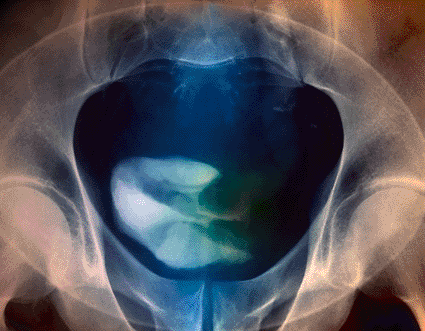Radiotherapy is as Effective as Surgery in Bladder Cancer Treatment
|
By MedImaging staff writers Posted on 11 Feb 2008 |

Image: Colored urogram of the pelvis of a 58-tyear-old patient with a malignant tumor in the left half of the bladder (Photo courtesy of Zephyr / SPL).
Radiotherapy has been shown to be as effective as surgery in treating bladder cancer, according to recent research.
The study has revealed that survival rates among bladder cancer patients treated with radiotherapy in Leeds, UK, are the same as those associated with radical cystectomy--surgery involving the complete removal of the bladder. This finding suggests that radiotherapy could be preferred over surgery, especially in elderly patients, because of the potentially severe impact on quality of life that removing the bladder can have.
The researchers, led by Dr. Anne Kiltie based at the Cancer Research UK Clinical Center (Leeds, UK), part of the Leeds Institute of Molecular Medicine at the University of Leeds, analyzed the medical records of 169 patients treated for invasive bladder cancer between 1996 and 2000. Ninety-seven of the patients had been treated with radiotherapy, while 89 had undergone surgery.
The survival rates for the two treatment groups, in relation to deaths from bladder cancer, were then compared five years and eight years after treatment, with no significant differences at either time interval found. The five-year survival rate for radiotherapy patients was 56.8%, compared with 53.4% of surgery-treated patients. At eight years, survival rates were 54.9% and 53.4%, respectively. This was in spite of the radiotherapy group being older, with an average age of 75.3 years compared with an average of 68.2 years for the surgery group.
There was also no difference in how likely the disease was to recur in the two treatment groups, with 34% of the radiotherapy treatment group experiencing recurrence, compared with 37.5% of those treated with surgery. Dr. Anne Kiltie, lead author of the study, said, "Until now surgery has been considered better than radiotherapy in the treatment of bladder cancer that has spread to the muscle wall of the bladder. Although radiotherapy carries its own long-term side effects, the interesting finding in our study was that the older, less fit patients did as well as the younger, fitter patients who had surgery to treat their cancer. Since bladder cancer is a disease of older people, radiotherapy will play an increasingly important role as the population ages, and this study encourages us to believe that such elderly patients will not be disadvantaged by having an alternative curative treatment to surgery for their bladder cancer.”
Currently, cystectomy surgery is regarded as the ‘gold standard' treatment for muscle-invasive bladder cancer in the United Kingdom, which is most common in elderly patients. Doctors typically choose to remove the whole bladder along with the prostate in men, and in some cases, the womb and ovaries in women.
However, this may result in continence problems, the use of a catheter, as well as the possibility of infections or other post-surgery complications. Dr. Lesley Walker, Cancer Research UK's director of cancer information, said, "Evaluating the various treatment options available is important in providing the most effective and appropriate care for cancer patients. This study certainly opens the debate on which treatments should be recommended for invasive bladder cancer patients, although the research is retrospective and the cohort of patients is small, so further investigations are necessary to establish if radiotherapy should replace surgery as the gold standard treatment for these patients.”
The study was published in the February 1, 2008, issue of the International Journal of Radiation Oncology Biology Physics.
Related Links:
Cancer Research UK Clinical Center
The study has revealed that survival rates among bladder cancer patients treated with radiotherapy in Leeds, UK, are the same as those associated with radical cystectomy--surgery involving the complete removal of the bladder. This finding suggests that radiotherapy could be preferred over surgery, especially in elderly patients, because of the potentially severe impact on quality of life that removing the bladder can have.
The researchers, led by Dr. Anne Kiltie based at the Cancer Research UK Clinical Center (Leeds, UK), part of the Leeds Institute of Molecular Medicine at the University of Leeds, analyzed the medical records of 169 patients treated for invasive bladder cancer between 1996 and 2000. Ninety-seven of the patients had been treated with radiotherapy, while 89 had undergone surgery.
The survival rates for the two treatment groups, in relation to deaths from bladder cancer, were then compared five years and eight years after treatment, with no significant differences at either time interval found. The five-year survival rate for radiotherapy patients was 56.8%, compared with 53.4% of surgery-treated patients. At eight years, survival rates were 54.9% and 53.4%, respectively. This was in spite of the radiotherapy group being older, with an average age of 75.3 years compared with an average of 68.2 years for the surgery group.
There was also no difference in how likely the disease was to recur in the two treatment groups, with 34% of the radiotherapy treatment group experiencing recurrence, compared with 37.5% of those treated with surgery. Dr. Anne Kiltie, lead author of the study, said, "Until now surgery has been considered better than radiotherapy in the treatment of bladder cancer that has spread to the muscle wall of the bladder. Although radiotherapy carries its own long-term side effects, the interesting finding in our study was that the older, less fit patients did as well as the younger, fitter patients who had surgery to treat their cancer. Since bladder cancer is a disease of older people, radiotherapy will play an increasingly important role as the population ages, and this study encourages us to believe that such elderly patients will not be disadvantaged by having an alternative curative treatment to surgery for their bladder cancer.”
Currently, cystectomy surgery is regarded as the ‘gold standard' treatment for muscle-invasive bladder cancer in the United Kingdom, which is most common in elderly patients. Doctors typically choose to remove the whole bladder along with the prostate in men, and in some cases, the womb and ovaries in women.
However, this may result in continence problems, the use of a catheter, as well as the possibility of infections or other post-surgery complications. Dr. Lesley Walker, Cancer Research UK's director of cancer information, said, "Evaluating the various treatment options available is important in providing the most effective and appropriate care for cancer patients. This study certainly opens the debate on which treatments should be recommended for invasive bladder cancer patients, although the research is retrospective and the cohort of patients is small, so further investigations are necessary to establish if radiotherapy should replace surgery as the gold standard treatment for these patients.”
The study was published in the February 1, 2008, issue of the International Journal of Radiation Oncology Biology Physics.
Related Links:
Cancer Research UK Clinical Center
Latest Nuclear Medicine News
- New Imaging Approach Could Reduce Need for Biopsies to Monitor Prostate Cancer
- Novel Radiolabeled Antibody Improves Diagnosis and Treatment of Solid Tumors
- Novel PET Imaging Approach Offers Never-Before-Seen View of Neuroinflammation
- Novel Radiotracer Identifies Biomarker for Triple-Negative Breast Cancer
- Innovative PET Imaging Technique to Help Diagnose Neurodegeneration
- New Molecular Imaging Test to Improve Lung Cancer Diagnosis
- Novel PET Technique Visualizes Spinal Cord Injuries to Predict Recovery
- Next-Gen Tau Radiotracers Outperform FDA-Approved Imaging Agents in Detecting Alzheimer’s
- Breakthrough Method Detects Inflammation in Body Using PET Imaging
- Advanced Imaging Reveals Hidden Metastases in High-Risk Prostate Cancer Patients
- Combining Advanced Imaging Technologies Offers Breakthrough in Glioblastoma Treatment
- New Molecular Imaging Agent Accurately Identifies Crucial Cancer Biomarker
- New Scans Light Up Aggressive Tumors for Better Treatment
- AI Stroke Brain Scan Readings Twice as Accurate as Current Method
- AI Analysis of PET/CT Images Predicts Side Effects of Immunotherapy in Lung Cancer
- New Imaging Agent to Drive Step-Change for Brain Cancer Imaging
Channels
Radiography
view channel
Machine Learning Algorithm Identifies Cardiovascular Risk from Routine Bone Density Scans
A new study published in the Journal of Bone and Mineral Research reveals that an automated machine learning program can predict the risk of cardiovascular events and falls or fractures by analyzing bone... Read more
AI Improves Early Detection of Interval Breast Cancers
Interval breast cancers, which occur between routine screenings, are easier to treat when detected earlier. Early detection can reduce the need for aggressive treatments and improve the chances of better outcomes.... Read more
World's Largest Class Single Crystal Diamond Radiation Detector Opens New Possibilities for Diagnostic Imaging
Diamonds possess ideal physical properties for radiation detection, such as exceptional thermal and chemical stability along with a quick response time. Made of carbon with an atomic number of six, diamonds... Read moreMRI
view channel
New MRI Technique Reveals Hidden Heart Issues
Traditional exercise stress tests conducted within an MRI machine require patients to lie flat, a position that artificially improves heart function by increasing stroke volume due to gravity-driven blood... Read more
Shorter MRI Exam Effectively Detects Cancer in Dense Breasts
Women with extremely dense breasts face a higher risk of missed breast cancer diagnoses, as dense glandular and fibrous tissue can obscure tumors on mammograms. While breast MRI is recommended for supplemental... Read moreUltrasound
view channel
New Incision-Free Technique Halts Growth of Debilitating Brain Lesions
Cerebral cavernous malformations (CCMs), also known as cavernomas, are abnormal clusters of blood vessels that can grow in the brain, spinal cord, or other parts of the body. While most cases remain asymptomatic,... Read more.jpeg)
AI-Powered Lung Ultrasound Outperforms Human Experts in Tuberculosis Diagnosis
Despite global declines in tuberculosis (TB) rates in previous years, the incidence of TB rose by 4.6% from 2020 to 2023. Early screening and rapid diagnosis are essential elements of the World Health... Read moreGeneral/Advanced Imaging
view channel
First-Of-Its-Kind Wearable Device Offers Revolutionary Alternative to CT Scans
Currently, patients with conditions such as heart failure, pneumonia, or respiratory distress often require multiple imaging procedures that are intermittent, disruptive, and involve high levels of radiation.... Read more
AI-Based CT Scan Analysis Predicts Early-Stage Kidney Damage Due to Cancer Treatments
Radioligand therapy, a form of targeted nuclear medicine, has recently gained attention for its potential in treating specific types of tumors. However, one of the potential side effects of this therapy... Read moreImaging IT
view channel
New Google Cloud Medical Imaging Suite Makes Imaging Healthcare Data More Accessible
Medical imaging is a critical tool used to diagnose patients, and there are billions of medical images scanned globally each year. Imaging data accounts for about 90% of all healthcare data1 and, until... Read more
Global AI in Medical Diagnostics Market to Be Driven by Demand for Image Recognition in Radiology
The global artificial intelligence (AI) in medical diagnostics market is expanding with early disease detection being one of its key applications and image recognition becoming a compelling consumer proposition... Read moreIndustry News
view channel
GE HealthCare and NVIDIA Collaboration to Reimagine Diagnostic Imaging
GE HealthCare (Chicago, IL, USA) has entered into a collaboration with NVIDIA (Santa Clara, CA, USA), expanding the existing relationship between the two companies to focus on pioneering innovation in... Read more
Patient-Specific 3D-Printed Phantoms Transform CT Imaging
New research has highlighted how anatomically precise, patient-specific 3D-printed phantoms are proving to be scalable, cost-effective, and efficient tools in the development of new CT scan algorithms... Read more
Siemens and Sectra Collaborate on Enhancing Radiology Workflows
Siemens Healthineers (Forchheim, Germany) and Sectra (Linköping, Sweden) have entered into a collaboration aimed at enhancing radiologists' diagnostic capabilities and, in turn, improving patient care... Read more








 Guided Devices.jpg)











